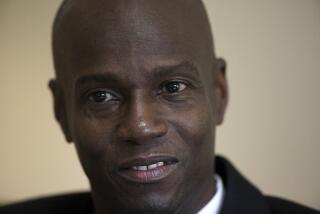WASHINGTON INSIGHT
- Share via
ARRESTING TWIST: President Clinton was indirectly responsible for the arrest of a woman who appeared by his side in the Rose Garden last Monday in an emotional plea for passage of the Administration’s crime bill. Janice Payne of Gretna, La., whose 9-year-old son was the victim of a drive-by slaying on Mother’s Day, was invited to the White House to help dramatize the need for new anti-crime legislation. Her son had sent Clinton a poignant letter imploring the President to “stop the killing” just nine days before his death. After Jefferson Parrish, La., authorities saw a newspaper photo of Payne with Clinton, they tracked her down and arrested her for unspecified violations of the terms of her probation on drug charges. White House aides said that, before she was invited to Washington, her name was run through the National Crime Information Center computer and “nothing (was found) that would have prohibited her from coming here”--despite an arrest warrant pending since September. She was booked Tuesday and then released because of jail overcrowding.
*
HELP WANTED: Backing the notion that the less time lawmakers spend in Washington, the less damage they can do, several conservative candidates are proposing a part-time Congress, with shorter sessions and smaller paychecks. Capitalizing on anti-Washington sentiment, Virginia Republican Senate nominee Oliver L. North, Tennessee GOP Senate candidate Fred Dalton Thompson and former Education Secretary Lamar Alexander, a likely presidential candidate, have offered plans for such changes as cutting back the session to six months a year and forcing lawmakers to take second jobs. “Anybody who’s watched C-SPAN knows lawmakers spend a lot of time giving speeches to empty rooms and not actually passing legislation,” North spokesman Dan McLagan says. Since the early 19th Century, Congress has met eight to nine months a year, and for good reason, some say. Maureen S. Steinbruner, president of the Center for National Policy, a Washington think tank, says that a proposal to cut hours and salaries “is flat-out wrong. You get what you pay for. . . . We want Congress to be able to do what it does better, not do it less.”
*
HOSTAGE OF THE HILL: According to plan, President Clinton was supposed to be relaxing on a beach by now, not haggling with members of the House over details of the crime bill. But the vacation has not gone according to plan. Officials now say their hope is that, if Congress finishes work on the crime bill this week, Clinton will leave town toward the end of next week--perhaps leaving the Senate behind to drone on in its health care debate. Among Clinton’s exhausted, somewhat strung-out staff, not everyone has taken the delay calmly. “You think you want a vacation,” scoffed one aide who had been called as a witness in Congress’ Whitewater hearings, “I’ve just been through six months of investigations.”
*
LUKEWARM APPROVAL: President Clinton’s tepid approval ratings of late are not necessarily bad, if history is any indication. At roughly 50% approval, which is where Clinton stood in June public polls, he is more popular than Presidents Gerald R. Ford, Jimmy Carter or Ronald Reagan were at the equivalent points of their tenures. Carter scored the worst after 17 months in office--42% approval in the Gallup Poll of June, 1978. After 17 months in office, Reagan was at 44% and Ford at 46%. Approval after 1 1/2 years in office has proved a poor barometer of reelection. Despite his low standings, Reagan won reelection. George Bush, who was at 69% in the polls in June, 1990, lost.
More to Read
Sign up for Essential California
The most important California stories and recommendations in your inbox every morning.
You may occasionally receive promotional content from the Los Angeles Times.








